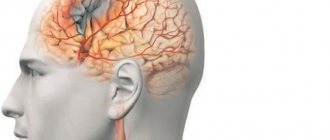Alzheimer's disease is one of the most common causes of senile dementia. Its share is 45% among all neurodegenerative diseases leading to dementia.
Despite the recent “rejuvenation” of Alzheimer’s pathology, in most cases it is clearly associated with age, choosing older groups of the population as its “victims”.
For this reason, the increasing life expectancy of people in highly developed countries is inevitably accompanied by an increasing risk of Alzheimer's disease. In addition, the increase in the patient population is facilitated by the development of medicine and improved diagnostic quality.
Alzheimer's disease initial symptoms and first signs in men and women
At the beginning, the disease is almost impossible to detect, but over time the symptoms become more and more noticeable.
It begins with loss of short-term memory. A person forgets where he put his things, who he saw on the street, what he said a few minutes ago. Later, periods that the patient does not remember become increasingly longer.
IMPORTANT: As the disease progresses, complete memory loss is possible.
Cognitive dysfunction occurs. The patient takes a pen, but cannot remember why it is needed or how to use it. A person forgets the name of objects and their functions. Speech disturbance occurs. The memory fails so much that the sick person forgets even the simplest words.
Over time, your health condition worsens. The ability to independently care for oneself is lost. The patient may not make it to the toilet, forgetting where it is. The body gradually fails, as if turning off the most important functions. Then comes death.
IMPORTANT: Women are more susceptible to the disease than men, especially after 80 years of age.
Alzheimer's disease begins with short-term memory loss
Signs of Alzheimer's disease in old age
In old age, diagnosing Alzheimer's disease without special tests is very difficult, since it is similar to other manifestations of aging.
For Alzheimer's disease in an elderly person:
- problems arise when trying to remember what happened yesterday
- new information is not remembered
- performing everyday simple tasks that were never difficult becomes difficult
- apathy appears
- hard to concentrate and plan anything
IMPORTANT: According to statistics, the risk of the disease in a 60-year-old is 1%, in an 85-year-old – 30-50%.
Alzheimer's disease makes it difficult for older adults to perform simple daily tasks
Manifestations of the disease
Diagnosis of Alzheimer's syndrome is difficult due to the identity of its manifestations with other mental disorders. It is very important to pay attention to any manifestations of senile changes that may be harbingers of a pathological process.
There are several signs that require special attention:
- Impaired memory function.
This is the main, most alarming sign of age-related dementia. Patients are asked to repeat the same phrase or sentence several times, since they are not able to perceive information immediately. Written reminders have to be used for patients. Occasional forgetfulness is also a sign of the disease, when a person is unable to remember where he put his keys or phone. Preventing symptoms and signs of Alzheimer's disease is important.
- State of apathy.
It manifests itself as indifference to even the most beloved hobbies, loss of interest in communicating with loved ones, friends and acquaintances. Against the background of dementia, a person stops watching programs that were interesting to him in the past, cheering for his favorite team, and stops communicating with his grandchildren. However, one should not confuse dementia with the elementary, natural desire of a person to take a break from everything and be alone with oneself.
- Lost in time and space.
Perhaps every person has experienced disorientation at some point. For example, immediately after a deep and long sleep, it may be difficult to immediately remember the time, date, and location. For patients with Alzheimer's syndrome, this condition is common. They cannot find their way around their own home and can get lost on the street, forgetting where their home is.
- Losing connection with real life.
Patients may not recognize loved ones, lose the ability to interpret images, and determine the depth of an object. They cannot read books, walk up stairs, take a bath, etc.
- Sudden changes in personality and mood.
Patients can perceive little things with aggression, demonstrating absolute indifference to serious things. They are characterized by sudden mood swings.
- Violation of oral and written communication.
Patients with dementia forget the names of even household objects such as a TV, stove, chair, etc.
- Impaired planning skills.
The result of this symptom is that a person is not able to organize his own time and finances, does not pay bills on time, is late, loses initial professional skills, etc.
- Monotonous actions.
In this case, patients cannot find objects in their usual places, finding, for example, slippers in the refrigerator or keys in the stove.
- Violation of cause-and-effect relationships.
A patient with Alzheimer's disease easily trusts scammers, stops taking care of his appearance and hygiene, dresses inappropriately for the season and weather, and also begins to spend money on unnecessary items.
If one or more of the listed signs are detected in an elderly person, you should consult a doctor, starting with a neurologist.
Alzheimer's disease test
To determine the disease, a number of tests are prescribed that will determine the disorders characteristic of Alzheimer's. Neuropsychological tests are aimed at identifying cognitive impairment.
A blood test is also prescribed which can identify factors influencing the course of the disease.
The patient also needs to undergo tests for depressive and apathetic states , which are signs of the disease.
The doctor conducts conversations with relatives and friends in order to determine at what point behavioral disturbances are observed, since the patient himself does not notice any changes.
Alzheimer's tests look for cognitive impairment
Alzheimer's disease diagnosis: MRI
In order to distinguish the disease from others, methods such as computed tomography, magnetic resonance imaging, positron emission tomography .
An effective diagnostic method is to visualize the patient’s brain on a PET scanner . The patient is injected with a specially developed substance that includes the radioactive isotope carbon-11. The machine shows beta-amyloid plaques and tangles in nerve cells. Such diagnostics are still difficult to access, but they are the most effective.
Diagnosis of Alzheimer's disease
Products in the diet
The diet of a person who wants to prevent the development of Alzheimer's pathology should consist of the following products:
An important point in nutrition is the maximum exclusion of fatty, sweet, spicy foods, alcohol, etc. Ideally, these foods should be completely abandoned.
Is Alzheimer's disease inherited?
In 1986, a conference on Alzheimer's problems was convened to mark the 80th anniversary of the discovery of the disease. It became known that through research the gene responsible for Alzheimer's disease had been found.
In most cases, the mutating gene is inherited . If a person has five children, at least two of them will suffer from the disease. However, there are very few genetic forms of Alzheimer's.
Scientists have proven that heredity does not play a major role in the risk of the disease.
Alzheimer's disease can be inherited
Elimination of provoking factors
The exact mechanisms of the onset and progression of Alzheimer's disease have not been fully established. Doctors identify several of the most likely causes of the syndrome. A person cannot influence the presence of risk factors such as genetic disorders, old age or being female. But it is possible to prevent Alzheimer's disease by eliminating or limiting other negative effects on the body.
Prevention of cerebrovascular disorders
Impaired supply of essential substances to the cells of the central nervous system leads to their damage, which greatly increases the risk of developing Alzheimer's disease. Complications of various cardiovascular pathologies, the formation of blood clots and the growth of tumors can lead to cerebrovascular accidents.
Blood pressure control
Reducing high blood pressure and maintaining it within normal limits is part of the prevention of cerebral stroke, and therefore is also included in the prevention of Alzheimer's disease. In addition, many scientific studies confirm the direct connection between hypertension and a high risk of developing the syndrome. It was found that patients with high systolic (upper) blood pressure are 2 times more likely to be affected by Alzheimer's pathology.
With increased systolic pressure, the blood supply to certain areas of the brain suffers, and the accumulation of beta-amyloid (a protein that damages the brain in Alzheimer's disease) increases. The question of the influence of high diastolic (lower) pressure on the course of pathology is controversial. Some scientists believe that there is no connection between them, while others argue the opposite. Doctors note that low blood pressure in people over 75 years of age (less than 70 mm Hg) also increases the risk of Alzheimer's disease by about 2 times.
It is possible to correctly bring blood pressure back to normal and prevent its increase only under the supervision of the attending physician. The approach should be comprehensive and include:
- moderate and regular physical activity;
- diet (reduce salt, fried and spicy foods);
- taking antihypertensive drugs prescribed by a specialist.
A patient with hyper- or hypotension should not only be regularly examined by a doctor, but also monitor blood pressure daily at home using a tonometer to prevent the development of dangerous conditions such as stroke and heart attack.
Maintaining normal cholesterol levels
Recent scientific research has shown that cholesterol accelerates the formation of beta-amyloid deposits that damage brain cells. Also, high levels of “bad” cholesterol (low-density lipoproteins) can cause the development of atherosclerosis of blood vessels, which will lead to disruption of the blood supply to brain tissue and their damage.
Important! People over 40 years of age need to have a blood test with lipid profile and glucose levels at least once a year to prevent their levels from being exceeded!
Normal values of lipoproteins (cholesterol) in the blood
| Lipoproteins | Norm |
| High density (“good” cholesterol) | not less than 1.02 - 1.54 mmol/l |
| Low density (“bad” cholesterol) | no more than 3.3 mmol/l |
| Very low density | no more than 1.65 mmol/l |
Prevention of Alzheimer's disease must include regular monitoring of blood cholesterol levels. To maintain its normal values, you should enrich your diet with vegetables, grains and fruits, and avoid eating fatty and fried foods. If it is not possible to keep cholesterol within physiological concentrations by following such a diet, then the development of pathologies can be prevented by taking statin drugs prescribed by a doctor. After completing a course of treatment with these medications (in combination with a diet), a blood test is taken to monitor changes in cholesterol levels in the blood.
Blood Sugar Control
Diabetes mellitus is one of the main risk factors for Alzheimer's disease. There is not one, but several mechanisms that lead to damage to brain cells in patients with elevated blood glucose concentrations. Therefore, it is necessary to first prevent the development of this disease, which will help reduce the risk of Alzheimer's syndrome.
In order to prevent Alzheimer's, patients with diabetes should constantly monitor their blood glucose levels through regular testing and using a glucometer. An endocrinologist who should see a person with a similar problem selects treatment, which includes:
- a special diet that excludes the consumption of “fast” carbohydrates (table No. 9 and its variations);
- taking medications that can prevent high blood sugar by mouth;
- insulin injections.
Important! Normal blood glucose levels range from 3.3 to 5.5 mmol/l!
Taking medications that lower blood glucose levels must be done with extreme caution. Inappropriate treatment can lead to the development of hypoglycemia (low blood sugar), which is even more dangerous for brain cells. Before you start taking any medications, you should consult specialist to prevent the development of critical conditions.
Prevent head injuries
Traumatic brain injuries significantly increase the likelihood of Alzheimer's pathology. You can get them from playing many sports, cycling, car accidents, falls and other ways.
It is possible to prevent Alzheimer's disease, which can result from such brain damage, by consistently protecting the head. Both when engaging in traumatic sports, and when skiing or snowboarding, cycling and riding a motorcycle, you should wear a protective helmet. While driving, do not be distracted, but pay close attention to the road.
You need to be careful with older people as many of them get injured due to common falls. Make sure there are no objects in the house that could cause you to trip or get caught when walking.
Treatment of early Alzheimer's disease
At an early stage, the symptoms of the disease are mild . A person can take care of himself and do normal household chores. Violations are manifested in the impoverishment of vocabulary, apathy, lack of composure, and forgetfulness.
In general, at this stage the patient only needs support in performing complex tasks that require effort.
It is necessary to prepare the patient for the further development of the disease. The doctor prescribes preventive medications that will improve cognitive function.
Help and support from loved ones is necessary at all stages of Alzheimer's disease
Healthy lifestyle
To avoid the development of the disease, it is necessary to lead a correct lifestyle. You should stop drinking alcohol and smoking.
Scientists recommend sleeping at least eight hours a day for successful recovery of the nervous system.
If a person does not get enough sleep for a long time, the physiological processes in the body become disrupted. This increases the production of cortisol, which is a stress hormone. This increases the risk of developing the disease. Due to lack of sleep, the cleansing of cellular waste from the brain occurs more slowly. It accumulates beta-amyloid, a marker of dementia.
Alzheimer's disease, treatment with folk remedies
Traditional medicine is powerless in the fight against this type of dementia . Some tips can only alleviate symptoms.
For example, you can use sesame oil in the fight against depression by putting it in your nose. Pumpkin seeds promote better brain functioning.
For herbal medicine, plants such as wormwood, calamus, chicory, dandelion, and hawthorn can be used.
In the fight against the disease, you can use Dioscorea tincture .
To prepare it you need:
- 500 ml vodka
- 50 grams of plant roots
- Chopped roots are placed in a glass container
- Poured with vodka
- Cover with a lid
The tincture should be prepared for 2 weeks and left in a dark place.
Take one teaspoon of tincture three times a day after meals.
IMPORTANT: The effectiveness of alternative treatment for symptoms of the disease has not been proven. Before using such methods, you should consult your doctor.
Sesame oil may help fight depression in Alzheimer's disease
The role of aluminum in the development of Alzheimer's disease
Among some of the causes of the disease, some scientists cite the ingestion of aluminum into the body . This can happen, for example, when using aluminum cookware. This theory is very controversial and has no evidence.
It is unlikely that aluminum affects the onset and development of Alzheimer's. Researchers had a similar opinion about zinc . But the connection of this element with the disease has not been established.
Cooking in aluminum cookware may cause Alzheimer's disease
Relationship with other diseases
Patients with Down syndrome are more susceptible to Alzheimer's than others; according to statistics, a quarter of patients with Down syndrome exhibit AD symptoms.
Apparently, this is due to earlier aging of the body with this genetic disease, which occurs already at the age of 20-30 years.
Other diseases that often accompany asthma are vascular pathologies and diabetes. According to one scientific hypothesis, this coincidence is facilitated by the common causes of diseases.
Currently, a detailed study is being carried out on the possible role of “bad cholesterol” in the development of Alzheimer’s, which causes cardiovascular diseases - atherosclerosis, strokes, and cerebral pathology.
How quickly does Alzheimer's disease progress?
If the disease is genetically determined and occurs at the age of 50-60 years, then it progresses quite quickly. It all starts with partial memory loss and cognitive impairment. After 7, maximum 10 years, death occurs.
If the disease occurs later and is directly related to aging, then development occurs more slowly. This type of Alzheimer's is characterized by non-permanent memory loss.
In most of these cases, the disease does not reach advanced stages. Life expectancy after diagnosis is longer and reaches up to 20 years.
Alzheimer's disease is incurable and progresses quite quickly
Methods for forming and strengthening connections between neurons
The more connections there are in a person's brain, the more difficult it is to disrupt its normal functioning. The formation of associative connections in the brain occurs at any age. Throughout our lives, we gain knowledge and skills that we either use or forget.
The more information we store in memory, the more associative connections between neurons, and the more difficult they are to destroy during illness.
Therefore, to prevent a pathology such as Alzheimer's disease, it is necessary to train your memory, which is quite easy for those who are already accustomed to doing this all the time.
Socially active people, enthusiastic people who have some kind of hobby, constantly strain their brains by solving various problems. To prevent the disease, especially for people who find themselves abruptly cut off from life upon retirement, it is useful to occupy themselves with some activity that develops connections in the brain, for example:
- to study a foreign language;
- participate in public activities (entrance, building, parent committee of grandchildren);
- take up collecting, hobbies;
- read more books, magazines;
- write memoirs;
- workout;
- solve crosswords, play chess.
Finding a useful and interesting activity is not difficult, and it will also prevent Alzheimer's disease.
How to prevent Alzheimer's disease: prevention in women and men
It is impossible to prevent the disease, but it is possible to adjust the factors that influence the risk of the disease. Prevention includes diet, treatment of cardiovascular diseases, exercise, and giving up bad habits.
IMPORTANT: Some researchers suggest that eating fish, wine, grains, fruits and vegetables may reduce the risk of disease.
The disease passes more slowly in people who are engaged in intellectual activity. Solving crossword puzzles, playing chess, and reading can be preventive methods for Alzheimer's.
For a long time it was believed that hormone replacement therapy in women helps reduce the risk of disease or mitigate the course of the disease, but now this fact has been refuted.
A healthy lifestyle and mental activity help fight Alzheimer's disease
What prevention methods can be used
It is already clear that Alzheimer's prevention should include the following aspects:
- limiting harmful effects on brain cells;
- formation and strengthening of connections between neurons;
- improving nutrition (diet) and protecting brain cells from damage.
Limiting the harmful effects on brain cells includes treating diseases that can lead to cerebrovascular accidents (stroke) and injuries. The list of such diseases is quite extensive. Of course, it includes pathologies of the cardiovascular system, atherosclerosis, and endocrine diseases.
For prevention, you can use medications that improve cerebral circulation, or use traditional methods.
Now there are drugs that reduce the activity of glutamate, which has a harmful effect on brain cells (Memantine). They are often prescribed to people with the first symptoms of pathology or those at risk.
Women in middle age need to be especially careful: it is during menopause that arterial hypertension often develops. A decrease in estrogen production causes an increase in blood cholesterol levels and a disturbance in calcium metabolism. Hence progressive atherosclerosis and other chronic diseases.
High blood pressure is accompanied by dizziness, and falls can lead to fractures, since disturbances in phosphorus-calcium metabolism lead to osteoporosis and brittle bones. Under these conditions, diet and treatment of major diseases with medications, as well as traditional methods, become of particular importance.












